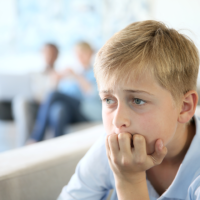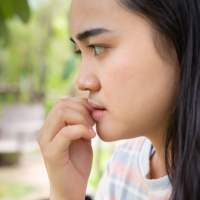Search results
- All (1274)
- Research Digests (210)
- Topics (15)
- Events (184)
- Blog (831)
- Podcasts (117)
- Free View (184)
-

Do children with social anxiety disorder benefit from social skills training?
Social anxiety disorder (SAD) in children can be difficult to treat, as evidenced by the varied outcomes reported post-treatment.1,2 Although childhood treatments for SAD commonly involve at least some social skills training,3 it isn’t clear whether children with SAD have particular difficulties with social skills. There is therefore a need to better establish whether social skills are an effective target for treating SAD.
Read more -

Are social networking sites contributing to depression and anxiety symptoms in young people?
Earlier this year, Elena Marie Piteo and Kelly Ward conducted a systematic review to examine the relationship between social networking site (SNS) use and depression and anxiety symptoms in young people.
Read more -

Negative interpretation bias in adolescents with subclinical social anxiety disorder
Social Anxiety Disorder (SAD) is a marked fear or anxiety of social situations where an individual may be exposed to possible scrutiny by others. Now, Yura Loscalzo and colleagues have examined the contribution of different components of interpretation bias — a model proposed to explain SAD whereby affected individuals systematically assign a threatening meaning to an objectively ambiguous stimulus with several possible interpretations.
Read more -

EEG data might help identify children at risk for social anxiety
Electroencephalography (EEG) is a non-invasive method to monitor the electrical activity of the brain. There are five main broad frequency bands in the EEG power spectrum: alpha, beta, gamma, delta and theta. Data suggest that EEG-derived delta–beta coupling — indicating related activity in the delta and beta frequency bands — might serve as a marker of emotion regulation.
Read more -

Do the same mechanisms drive social anxiety in autistic and neurotypical adolescents?
Researchers at King’s College London have recently published data on how cognitive, emotional and sensory factors are associated with social anxiety in adolescents with autism.
Read more -

Coupled delta-beta wave activity might predict social anxiety in children
Researchers from McMaster University, Canada, have examined whether individual differences in salivary cortisol levels at baseline and parent-reported social anxiety levels are associated with resting, coupled delta–beta frontal wave activity.
Read more -

Paediatric anxiety disorders confer a considerable public health burden
Anxiety disorders usually begin in childhood or adolescence and are the most common mental health condition across the life span.1,2 Consequently, intense research efforts are focused on delineating the underlying mechanisms of paediatric anxiety so that we can better identify those at risk and intervene early.
Read more -

CBT and sertraline are effective treatments for paediatric anxiety, but how do they work?
Matti Cervin and colleagues analysed data from the largest RCT for paediatric anxiety disorders to examine how these treatments affect different domains of anxiety
Read more -

The association between anxiety and poor school attendance
School plays a key role in children’s development, and frequent absence from school increases the likelihood of a range of adverse outcomes in childhood and later life. This includes poor academic performance, social isolation, economic deprivation and unemployment in adulthood. There are many risk factors for frequent school absence, including factors related to the child and their family, school and community.
Read more -
Adult ABMT protocols need adapting for effective use in children
Attention bias modification treatment (ABMT) aims to target attention biases in threat processing in patients with anxiety1. While ABMT seems to be effective in adults with social anxiety disorder (SAD),2,3 its effect in youths with SAD and the potential treatment moderators are unclear. In 2016, Lee Pergamin-Hight and colleagues conducted a randomised controlled trial to explore the efficacy of ABMT in youths and the influence of possible moderators of treatment outcomes.
Read more
